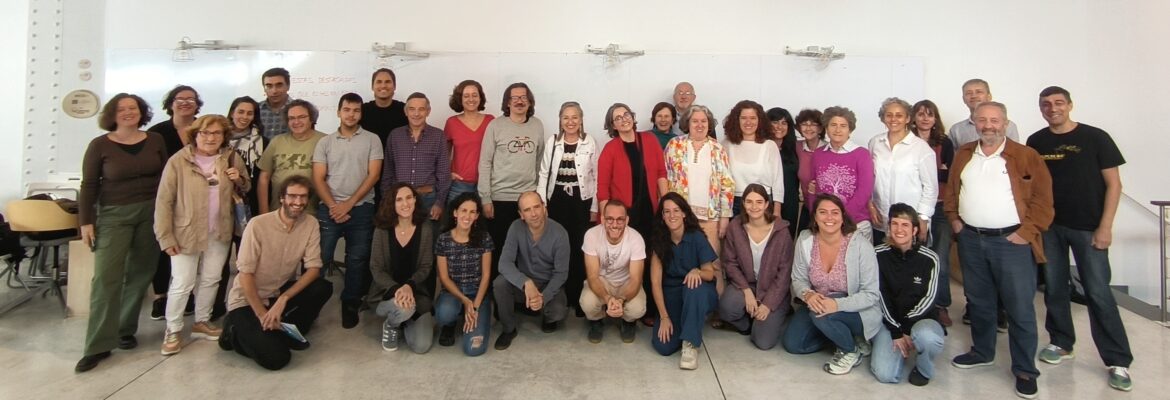
-
Facultade de Económicas
Universidade de Vigo
-
observatorio.eolico@uvigo.gal
-
The GWO participates in the National Meeting: Energy Communities against Vulnerability
- Home
- Wind World
- The GWO participates in the National Meeting: Energy Communities against Vulnerability

- by OEGA
- 0 Comments
Last Saturday, September 28, the GWO participated in the national meeting “Energy Communities against Vulnerability,” organized by the Platform for a New Energy Model. This is a citizen initiative that advocates for a transition towards a socially just and environmentally sustainable energy model.
The event was held at Ecooo, a space committed to promoting a renewable, sustainable, and citizen-led energy model. It brought together notable organizations such as the Platform for a New Energy Model (Px1NME), the Coalition for Community Energy, the Ecooo Community Transformation Office, OTC EMSV Getafe: Getafe Energy Community, Garesbide Energy Community, SEO Birdlife Institution: Shared Self-Consumption in Vallecas (Madrid), Torreblanca Ilumina Energy Community in Seville, Catarroja Energy Community in Valencia, La Bordeta Energy Community in Barcelona, and Energía Bonita Energy Community in La Palma.

GWO’s participation, fully aligned with the goals of the EC4RURAL project, emphasizes our commitment to citizen participation and the inclusion of vulnerable groups in the development of sustainable energy communities. We recognize that the energy transition will only be fair and effective if built through the active cooperation of all individuals. Additionally, GWO values the importance of networking between existing projects and initiatives, fostering knowledge exchange that strengthens collective impact and enables more efficient and equitable solutions to the energy crisis.
The meeting was structured into three discussion panels. The first panel focused on the European framework for energy communities (EC) and the opportunities they offer for vulnerable groups. The second panel addressed energy communities’ experiences in combating energy poverty, exploring how such initiatives can involve administrations, third-sector organizations, and citizens in inclusive ways. Lastly, the group workshops distilled the key insights from the meeting into three thematic areas: key proposals, gaps in current measures, and the role of government in supporting energy communities.
At the meeting, the Galician Wind Observatory gained important insights that bolster its mission of fostering a just and inclusive energy transition. Firstly, it was highlighted that energy communities are not merely a technical tool for generating and managing kilowatts; they also serve as interconnected social spaces with a strong social dimension, acting as platforms for energy education and community transformation. Furthermore, these initiatives highlight the shortcomings of the current electrical system, which precariously impacts and marginalizes large segments of the population. They also serve as a powerful platform for advocating energy as a fundamental right.

Another critical concern is the risk of large corporations co-opting the concept of energy communities, underscoring the importance of building autonomous and genuinely inclusive energy communities. This requires avoiding practices that exploit people or adopt paternalistic approaches. The success of these initiatives clearly depends on a multidimensional effort, in which active citizen participation is essential. This bottom-up approach ensures that energy communities are designed to address the specific needs and aspirations of their members. Additionally, collaboration with sectors such as local governments and social services is vital for identifying vulnerable groups and integrating them into these energy communities.
The urgent need for specialized facilitators and organizers was also acknowledged, as they are crucial for fostering active social participation and maintaining cohesion within energy communities, ensuring these initiatives remain strong and do not fall apart.
Lastly, the importance of encouraging participation through household units rather than individual contracts (CUPS) was emphasized, as this approach helps to address gender disparities that often limit participation to account holders, who are predominantly men. Collective education and training were also highlighted as essential pillars for fostering democratic and equitable decision-making within energy communities. These efforts contribute to establishing best practices that serve as benchmarks and promote knowledge sharing between communities. Additionally, the need for a solidarity fund was underscored, enabling individuals with limited resources to fully participate in these initiatives by covering entry costs. This measure is vital to fostering a genuinely inclusive social economy.
GWO and the EC4RURAL project are working together on all these fronts, building partnerships with third parties and promoting energy transition initiatives that are inclusive and equal.